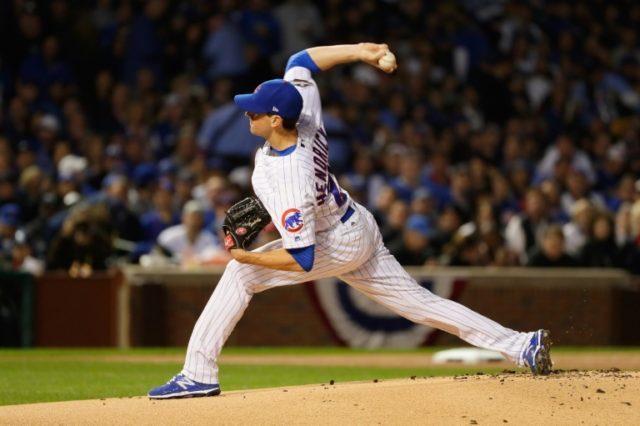Cleveland (AFP) – In the 71 years since the Chicago Cubs last played in baseball’s World Series, America and its national pastime have undergone major social, technological and economic transformations.
No longer are African-American players banned. Now fans can watch on television even as the price of such broadcasts has sent salaries and ticket prices soaring.
The Cubs, who have not won Major League Baseball’s best-of-seven final since 1908, make their first World Series appearance since 1945 on Tuesday at Cleveland as the Indians host the Fall Classic’s 112th opener.
In October 1908, Theodore Roosevelt was America’s president. The nation had only 46 states. Orville Wright had just made the first hour-long flight, Henry Ford’s first Model T automobile was coming off the assembly line and US cowboy outlaws Butch Cassidy and the Sundance Kid were still roaming in Bolivia.
In October 1945, World War II had ended only weeks before. The first World Series telecast was two years away. Color coverage was a decade off. But only a few thousand homes had televisions anyway. More than a third of US homes lacked flushable toilets.
With America’s longest sport title drought on the brink of ending, 62-year-old Cubs manager Joe Maddon finds himself at the intersection of iconic history — people who have waited a lifetime, some who died waiting, for this moment — and the team of 20-something talents who got this far with little worry about such bygone days.
“I have a strong appreciation of all of this,” Maddon said. “I’ve talked to all these dudes about the past and what’s going on right now. The game is absolutely the same and entirely different, if that makes any sense.
“My roots are in traditional, fundamental baseball, whereas I’m also very much into whatever’s available right now that’s able to help you. In the early ’90s, I’m packing a computer on airplanes and guys are making fun of me. Now everybody has got one in their briefcase. It’s just the way it is.
“Air conditioning is popular right now. So is color TV. You’ve just got to change with the times.”
– Connection to past important –
Nothing brings that point home more than Jackie Robinson, who eventually would become the first black player in Major League Baseball, signing a contract with the Montreal Royals minor-league team less than two weeks after the Cubs lost to Detroit in the 1945 World Series.
Robinson’s jersey number, 42, is now retired by all major league clubs and his story has been immortalized on film.
“Jackie Robinson, you’ll see his posters in my offices,” Maddon said. “The other night my wife and I fell asleep watching the movie 42.
“I’m that guy. I cry easily, so the connection to the past is very important.”
In 1908, vacuum cleaners were new, American Jack Johnson became the first black heavyweight boxing champion, the Cubs’ 102-year-old Wrigley Field was six years from being built and about 90 million people lived in America.
In 1945, there were about 140 million people in the United States compared to about 325 million now.
Today’s dollar was worth about seven cents in 1945, when the US minimum wage jumped to 40 cents an hour.
World Series tickets in 1945 were $6 or $7, about $80 to $96 in 2016 funds when allowing for inflation. Resale prices, according to newspaper acounts, were $25 to $50.
For this year’s World Series, StubHub and SeatGeek featured average prices above $3,000, three times what LeBron James and the Cavaliers were commanding for the NBA Finals in June, with TicketIQ saying the Cubs’ first home game was above some Super Bowl levels at $6,000.
Famed actor and comedian Bill Murray, now age 66, had not been born the last time his beloved Cubs were in the World Series.
“The history means a lot,” Cubs pitcher Kyle Hendricks said. “It puts it in perspective for us. We enjoy it more, because we know it means to the fans.”

COMMENTS
Please let us know if you're having issues with commenting.